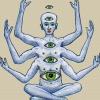Share techniques, exercises, therapies etc. that improve mood and mental functions such as cognition, memory, intelligence, motivation, attention, and concentration in this topic.
1. Physical exercise
A 2008 review of cognitive enrichment therapies (strategies to slow or reverse cognitive decline) concluded that "physical activity, and aerobic exercise in particular, enhances older adults' cognitive function".
In mice, exercise improves cognitive functioning via improvement of hippocampus-dependent spatial learning, and enhancement of synaptic plasticity and neurogenesis. In addition, physical activity has been shown to be neuroprotective in many neurodegenerative and neuromuscular diseases. For instance, it reduces the risk of developing dementia. Furthermore, anecdotal evidence suggests that frequent exercise may reverse alcohol-induced brain damage.
There are several possibilities for why exercise is beneficial for the brain. Examples are as follows:
- increasing the blood and oxygen flow to the brain
- increasing growth factors that help create new nerve cells and promote synaptic plasticity
- increasing chemicals in the brain that help cognition, such as dopamine, glutamate, norepinephrine, and serotonin
Physical activity is thought to have other beneficial effects related to cognition as it increases levels of nerve growth factors, which support the survival and growth of a number of neuronal cells.
Endorphins act as a natural pain reliever and antidepressant in the body. Endorphins have long been regarded as responsible for what is known as "runner's high", a euphoric feeling a person receives from intense physical exertion. However, recent research indicates that anandamide may possibly play a greater role than endorphins in "runner's high". When a person exercises, levels of both circulating serotonin and endorphins are increased. These levels are known to stay elevated even several days after exercise is discontinued, possibly contributing to improvement in mood, increased self-esteem, and weight management. Exercise alone is a potential prevention method and/or treatment for mild forms of depression. Research has also shown that when exercise is done in the presence of other people (familiar or not), it can be more effective in reducing stress than simply exercising alone.
Source: http://en.wikipedia....#Brain_function
2. Cold showers
Depression is a debilitating mood disorder that is among the top causes of disability worldwide. It can be characterized by a set of somatic, emotional, and behavioral symptoms, one of which is a high risk of suicide. This work presents a hypothesis that depression may be caused by the convergence of two factors: (A) A lifestyle that lacks certain physiological stressors that have been experienced by primates through millions of years of evolution, such as brief changes in body temperature (e.g. cold swim), and this lack of "thermal exercise" may cause inadequate functioning of the brain. (B) Genetic makeup that predisposes an individual to be affected by the above condition more seriously than other people. To test the hypothesis, an approach to treating depression is proposed that consists of adapted cold showers (20 degrees C, 2-3 min, preceded by a 5-min gradual adaptation to make the procedure less shocking) performed once or twice daily. The proposed duration of treatment is several weeks to several months. The following evidence appears to support the hypothesis: Exposure to cold is known to activate the sympathetic nervous system and increase the blood level of beta-endorphin and noradrenaline and to increase synaptic release of noradrenaline in the brain as well. Additionally, due to the high density of cold receptors in the skin, a cold shower is expected to send an overwhelming amount of electrical impulses from peripheral nerve endings to the brain, which could result in an anti-depressive effect. Practical testing by a statistically insignificant number of people, who did not have sufficient symptoms to be diagnosed with depression, showed that the cold hydrotherapy can relieve depressive symptoms rather effectively. The therapy was also found to have a significant analgesic effect and it does not appear to have noticeable side effects or cause dependence. In conclusion, wider and more rigorous studies would be needed to test the validity of the hypothesis.
Source: http://www.ncbi.nlm....pubmed/17993252
Edited by Now, 01 April 2012 - 02:07 PM.






















































